1. Features
Patriot Memory recently released the new Torqx 2 – a new SSD that has been designed to deliver a balance of price and performance. The Patriot Torqx 2 series of 2.5-inch SSDs enables users to boost performance of existing desktops and notebooks, since it is using a SATA 3.0 Gb/s and not the SATA 6.0 Gb/s interface.
The Torqx 2 is based on a Phison controller (PS PS3105-S5 ,) which enables the Patriot Torqx 2 to achieve read speeds up to 270MB/s and take advantage of the SATA 3.0 Gb/s interface. Write speeds up to 230MB/s, according to the official specifications of the 128GB version of the Torqx 2 SSD, which we will test today.
The Patriot Torqx 2 series also incorporates TRIM technology to ensure the drive always maintains maximum performance with compatible operating systems.
The Patriot Torqx 2 ships in 32GB, 64GB, 128GB and 256GB capacities.
Specifications
- Sequential Read: up to 270MB/s
- Sequential Write: up to 230MB/s
- Interface: SATA I/II
- TRIM Support (O/S dependent)
- RAID Support: Yes
- 128MB DRAM Cache
- Power Consumption: DC 5V, Standby 0.5W, Operating 5.3W
- MTBF: > 1,500,000 Hours
- Data Retention: >5 years at 25° C
- Data Reliability: Built in BCH 9, 24-bit ECC
- Operating Temperature: 0°C~70°C
- Storage Temperature: 40°C~85°C
- Operating Shock: 1,500G (@ 0.5msec half sine wave)
- Vibration Resistance: 20G/80~2000Hz w 3 axis
- Humidity: 0°C to 55°C / 95% RH, 10 cycles
- O/S Support: Win XP / Vista / 7

2. Meet the Patriot Memory Torqx 2 128GB SSD
The 128GB Patriot Torqx 2 SSD (PT2128GS25SSD) we have in our labs retails online for $225.00 and it is backed by 3 years of warranty.
The 2.5" SSD is packaged in a slim box and as you see in the picture below, the device is visible through the transparent opening on the front side of the box. The straight forward packaging catch your attention with the designated orange. Drive features are listed on the reverse.


A slim plastic case is perfectly keeping the SSD in place into the main box:

The Patriot SSDs measure 99.8 x 69.63 x 9.3mm and weigh just 77 grams, thanks to their slim 2.5" design.
Inside we find the SSD as well as a specification and installation pamphlet. Instructions are provided for installation in both desktop and notebook computers.
Standard 2.5" drive bay mounting points are pre-drilled and threaded into the Patriot Torqx 2 SSD chassis, which allows for quick upgrade or addition into any existing notebook and other compact computer system. However, the SSD kit lacks a 3.5-to-2.5" tray adapter, useful if you plan to install this drive into your desktop computer.
The drive uses a SATA II interface, which offers a 3Gbps maximum data rate.


The Patriot drive is using Toshiba TH58NVG7D2FLA89 32nm MLC NAND flash memory which supports an 8K page size. On the drive's PCB you will find eight 16GB memory chips totaling 128GB.
As we previously mentioned, the Torqx 2 128GB SSD is based on controller made by Taiwan-based PHISON Electronics Corporation. Phison.

PHISON's PS PS3105-S5 SATA-to-Flash micro-controller is designed for SATA SSD, mini-SATA module and embedded NAND applications. It support 20/30/40+ nm MLC/SLC Large-Block NAND flash memory with up to 32 chips and features a build-in 28/32/48-bit hardware ECC circuit (BCH).
Using a 128MB Mobile-DDR Cache, the Torqx 2 SSD can offer ONFI 2.0 build-in static and dynamic NAND wear-leveling without compromising capacity for over-provisioning. PHISON also claims that its chip enables MLC NAND read and write speeds up to 250/220 MB/s, which are lower than those quoted by Patriot.
Installing the 128GB Patriot Torqx 2 SSD product is very easy, nothing to care about. After booting into Windows, we were able to get the first amount of information with CrystalDiskInfo software. The product came in with firmware version S5FAM005 installed:

Intel's software in our PC also provides some information about the drive. As you see in the screen shot below, the drive is offering 122,104 MB of storage:

3. Benchmarks - page 1
Here is our testbed:
- Motherboard: Foxconn Quantum Force Rattler P67 vP04 BIOS
- Processor: Intel Core i5-2500K
- Case: Open Air testbed
- Power Supply Unit: Club 3D CSP-X1000CB 1000 Watt
- Graphics card: Club3D Radeon HD 6790 CoolStream Edition
- Memory: OCZ Gold PC3-10600 4x2GB 1333@CL9
- HDD: WD 500GB 7200RPM
- Monitor: LG L246WH-BH 24"
- Windows 7 x64 SP1 with latest updates installed
The "enable advanced performance" option was selected under the device's properties (OS). For the tests, we used the following software leaving their settings to defaults:
- HDTachRW v3.0.1.0
- HD Tune v4.50 Pro
- Crystal DiskMark v3
- ATTO Disk Benchmark v2.46
- ASS SSD Benchmark 1.5xxx
- IOMeter v2006.07.27 with Xtreme Benchmark template
- PCMark Professional edition v1.04
- AIDA64 Disk Benchmark Extreme Edition
- Sysoft Sandra
We start the tests with the HDTachRW software. HD Tach is a low level hardware benchmark for random access read/write storage devices. The software measures the sequential read speed (at various points on the device), the random access speed and sequential write speed.
The software reported an average sequential writing speed of 180.3 MB/s and a sequential reading of 195.9 MB/s. The results are lower than what we expected and those quoted by Patriot.
HDTach’s fixed strides between sample points causes issues. The software uses fixed strides across the array to measure small block sizes. The periodicities of the stride pattern and the flash memory address space may cause some wave-like
interference patterns of the benchmark results that are also measuring artifacts rather than being
indicative of performance. "

The HD Tune Pro software is also a utility we used to measure the drive's reading performance. Although not necessarily representative of real-world workloads, HD Tune's targeted tests give us a glimpse of each drive's raw capabilities.
In the a sequential read test, the drive read the data at 213.6 MB/s (average), which is again slower than we expected:

Here is another sequential file test. We used 64MB of data comprising out of sizes ranging from 0,5 KB to 8 MB. As you see in the benchmark below, the Patriot Torqx 2 SSD was faster once it passed the 128KB file size. The performance for write topped at around 212MB/s and for read close to 245MB/s:

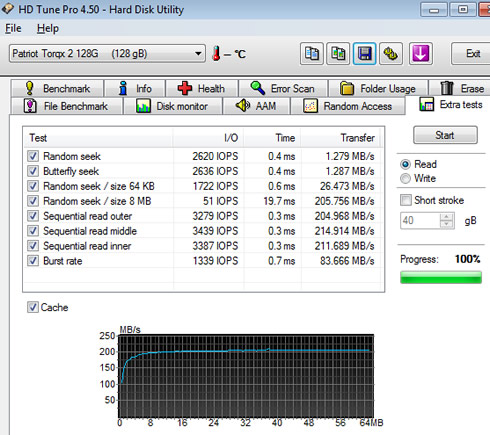
The HD Tune Pro also allows random access read testing. Here are some more results with the software to randomly seek files of different sizes:
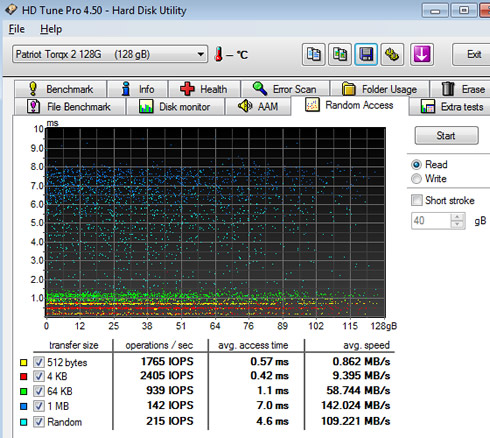
The 512 bytes performance of the Patriot Torqx 2 128GB was rather weak, particularly the read throughput which reached just 0.862MB/s. The 1MB performance was also relatively weak at 142.024 MB/s. Finally at the random read tests, which use random file sizes, the Patriot Torqx 2 128GB performance is quite poor.
The following test is the AIDA64 Disk Benchmark, which determines the data transfer speed of hard disk drives, solid-state drives, optical drives, and flash memory based devices. At the random read test with a 512Mb file, the 128GB Patriot Torqx 2 SSD returned a 248.1 MB/s, while the average access time was 0.58 ms.
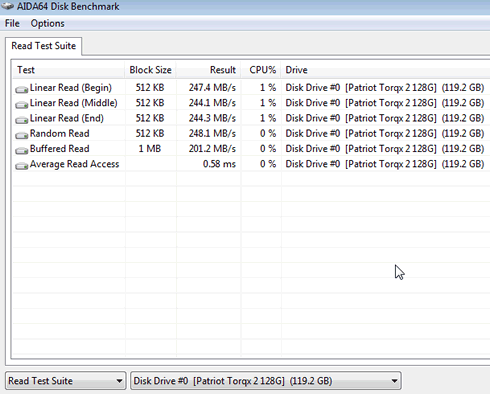
The next software we used was the ATTO Disk Benchmark. The tool measures storage systems performance with various transfer sizes and test lengths for reads and writes. The benchmark performs file transfers ranging from 0.5 KB to 8192 KB.
This time the drive gave the expected performance an average of 225 MB/s for write and more than 265 MB/s for read , especially with files larger than 128 KB, in Queue Depth 4. These meet with the manufacturer's own specification.

Generally, ATTO is the preferred standard benchmarking software as while it runs spot data is has several advantages over other HDD benchmarks including the fact that it shows the specific speed of each file size transfer and shows a true average, this benchmarking product also doesn't seem to favor SRAM over DRAM caches.
The next benchmark is the CrystalDiskMark. The software provides throughput data based on sequential reads and writes, and random (512K/4K/4KQD32) reads and writes. We've used the default 1,000MB file-size for the tests.

Sequential tests on this Phison PS3105-S5 SSD produced a maximum read speed of 254.8 MB/s, while the write speed was 224.6 MB/s. Both results are not bad for a budget SSD.
CrystalDiskMark 3.0 reported 512K results of 156.6 MB/s read and 192.6 MB/s write performance, which should be considered as weak.
4K tests produced 12.64 read and 45.30 write performance.
4KB queue depth 32 IOPS is one area where high-end SSDs excel. The 128GB Patriot Torqx 2 SSD gave a decent performance for a $225 128GB SSD.
We proceed with the AS SSD benchmark, which contains five synthetic as well as three practical tests. The synthetic tests determine the sequential and the random read / write performance of an SSD. These tests are carried out without using the operating system's cache. The Seq-test measures how long it takes to read and write an 1GB file.
The 4K benchmark tests the read and write performance for random 4K blocks. The 4K-64-THRD-test corresponds to the 4K procedure except that here the read and write operations are distributed on 64 threads.

Beginning with sequential read and write performance, the 128GB Patriot Torqx 2 SSD produced 248.45 MB/s read speed, and 211.62 MB/s write performance.
Single-threaded 4K IOPS performance delivers 9.25 MB/s read and 36.05 MB/s write, while the 64-thread 4K reads recorded 71.68 MB/s and write performance was 47.39 MB/s.
Again, all the above results are adequate for a budget SSD. In addition, although the drive showed increased access times for read (0.544 ms,) it was significantly faster during write (0.108 ms):
In the following test, the 128GB Patriot Torqx 2 SSD is reading and writing files, which have been partially of fully compressed. Reading seems to be not affected by whether the files are compressed or not, and the drive returned a solid performance of about 240 MB/s. Writing was slower than reading at about 210 MB/s and was gradually lowering as the drive was writing more compressed files:

4. Benchmarks - page 2
We proceed to IOMeter benchmark. Iometer is run by using workstation and database patterns for queue depths (outstanding I/Os) of two and 32, representing very light and moderate loads. Iometer is both a workload generator (that is, it performs I/O operations in order to stress the system) and a measurement tool (that is, it examines and records the performance of its I/O operations and their impact on the system). The app's ability to bombard drives with an escalating number of concurrent IO requests also does a nice job of simulating the sort of demanding multi-user environments that are common in enterprise applications. It can be used for measurement of the performance of an SSD. We run the IOMeter tests using the Xtreme Benchmark template .
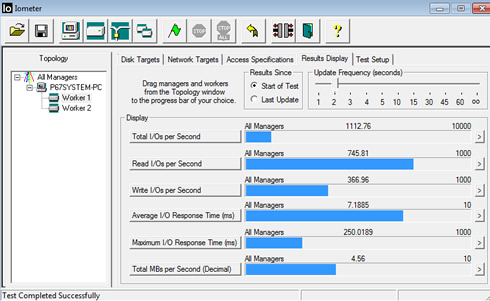
With only 1112.76 combined IOPS, the Patriot Torqx 2 rounds out the low-end of all solid state drive devices. In addition, the average I/O response time was extremely high for an SSD (7.1855 ms)
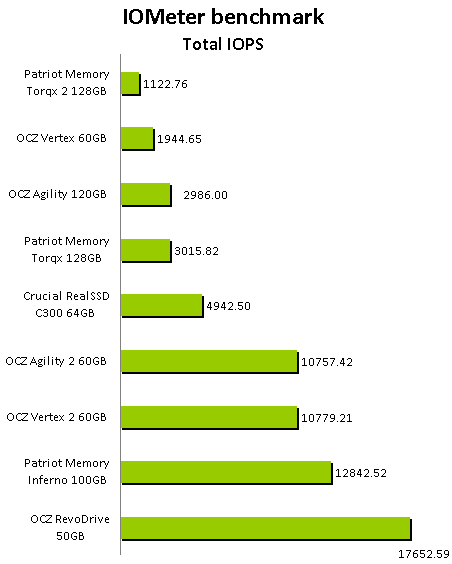

Below you see the results of Futuremark's PCMark 7 Professional edition. The drive scored 3421 points. Below you see the performance of the 128GB Patriot Torqx 2 SSD in various tasks defined by the software:

5. Final thoughts
Phison says that its PS3105-S5 SSD controller offers 250 MB/s sequential reads and 220 MB/s writes, which somehow Patriot claims to have increased to 270 MB/s read and 230 MB/s write maximum speeds. In the majority of our benchmarks, the performance numbers of the 128GB Patriot Torqx 2 matched the Phison specification. The SSD delivered 254.8 /224.6 MB/s peak read and writes speeds using the CrystalMark and ATTO Disk Benchmark SSD speed tests. Benchmarks such as the HDTachRW and the HD Tune produced lower results. We should also mention the drive's lacklustre random write performance.
As it was expected , the drive performed better when it dealt with files larger than 128KB. For instance, in the ATTO Benchmark, the Patriot Torqx 2 gave an average of 225 MB/s for write and more than 265 MB/s for read , especially with files larger than 128 KB, in Queue Depth 4.
On the other hand, the 128GB SSD was slow at the Iometer operational performance tests, with the 1194. With such a performance,
the Patriot Torqx 2 rounds out the low-end of all solid state drive devices. In addition, the average I/O response time was extremely high (7.1855 ms).

In terms of overall value, Patriot has priced their entry-level Torqx 2 SSDs to be affordable when compared to other current-generation solid-state storage products of the same capacity. Patriot's 128GB: PT2128GS25SSDR retails online for $225, which is a good price for the category.
With all these in mind, users who just need a good alternative to their hard disk storage and do not have a 6Gb/s SATA notebook, could easily choose the 128GB Torqx 2 SSD. Iit's significantly quicker than a hard disk, has ample sequential throughput and it offers many of the benefits of solid-state storage;, no moving parts, greater resistance to shock and silent operation.
Hardware enthusiasts could look to other solutions if they need quick response times, their workload revolves around random reads and writes and work under demanding applications and I/O environments.
Pros:
+ 265/225 MBps read/write speed with ATTO
+ Supports TRIM, NCQ, and SMART
+ Consistent read and write
+ 3-Year Patriot product warranty support
+ Good price
Cons:
- Very low solid state IOPS performance
- Response times could be lower